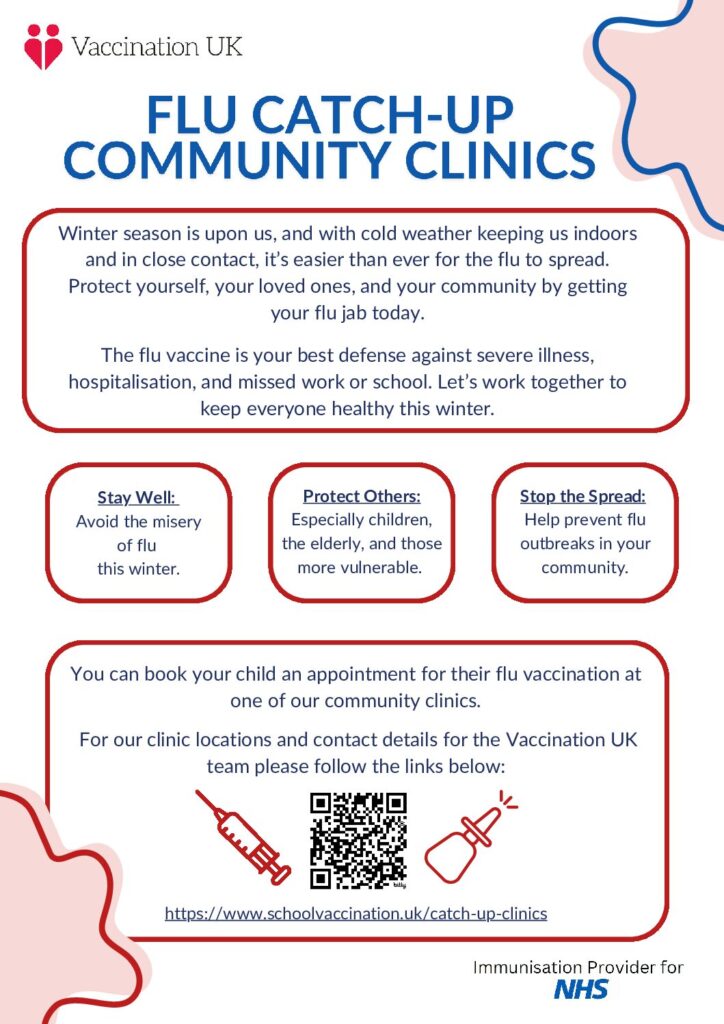The Village Practice will be offering Flu Vaccines from 3rd October 2024 till end of March 2025. If you are eligible we will text you with self-booking links to our clinics or you can call reception on 02077006464 to check your eligibility.
Flu vaccination is safe and effective. It’s offered every year through the NHS to help protect people at risk of getting seriously ill from flu.
Why flu vaccination is important
Flu vaccination is important because, while flu is unpleasant for most people, it can be dangerous and even life threatening for some people, particularly those with certain health conditions.
The best time to have your flu vaccine is in the autumn or early winter before flu starts spreading. But you can get your vaccine later.
Who can have the flu vaccine?
The flu vaccine is given free on the NHS to adults who:
- are 65 and over (including those who will be 65 by 31 March 2024)
- have certain health conditions
- are pregnant
- are in long-stay residential care
- receive a carer’s allowance, or are the main carer for an older or disabled person who may be at risk if you get sick
- live with someone who is more likely to get a severe infection due to a weakened immune system, such as someone living with HIV, someone who has had a transplant, or is having certain treatments for cancer, lupus or rheumatoid arthritis
- We also offer flu vaccines for 2-3 year olds (if your child has started school they will be offered at school)
Vaccinations for Flu must be administered according to the following schedule below:
From 1st September 2024
• Pregnant women
• Children aged 2 or 3 years on 31st August 2024
• Children aged 6 months to under 18 years in clinical risk groups (as defined by the Green Book)
From 3rd October 2024
• Aged 65 years and over
• Aged 18 years to under 65 years in clinical risk groups (as defined by the Green Book)
• Care home residents (living in long-stay residential care homes)
• Carers
• Close contact of immunocompromised individuals
• Frontline social care staff
Non-urgent advice: Important
It’s important to go to your vaccination appointments unless you have a high temperature or feel too unwell to go to work or do your normal activities.
Flu vaccine for people with long-term health conditions
The flu vaccine is offered free on the NHS to people with certain long-term health conditions, including:
- respiratory conditions, such as asthma (needing a steroid inhaler or tablets), chronic obstructive pulmonary disease (COPD), including emphysema and bronchitis
- diabetes
- heart conditions, such as coronary heart disease or heart failure
- being very overweight – a body mass index (BMI) of 40 or above
- chronic kidney disease
- liver disease, such as cirrhosis or hepatitis
- some neurological conditions, such as Parkinson’s disease, motor neurone disease, multiple sclerosis (MS), or cerebral palsy
- a learning disability
- problems with your spleen like sickle cell disease, or if you’ve had your spleen removed
- a weakened immune system as a result of conditions such as HIV and AIDS, or taking medicines such as steroid tablets or chemotherapy
Talk to your doctor if you have a long-term health condition that is not in one of these groups. They should offer you a flu vaccine if they think you’re at risk of serious health problems if you get flu.
Flu vaccine if you’re pregnant
You should have the flu vaccine if you’re pregnant to help protect you and your baby.
It’s safe to have a flu vaccine at any stage of pregnancy.
Find out more about flu vaccine in pregnancy


